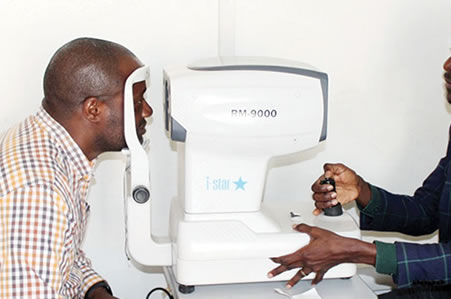A glaucoma expert, Professor Affiong Ibanga, has advised Nigerians who are experiencing trouble driving or who bump into objects at night to have their eyes examined in order to rule out glaucoma, a silent cause of blindness that affects one in 20 adults over the age of 40.
In a lecture titled “Unlocking the Mysteries of Glaucoma—All You Need to Know” at the Eleta Eye Institute, Ibanga, the Chair of the Oyinade Odutola-Olurin Professional Chair of Glaucoma Care and Research, revealed that up to 19 out of 20 glaucoma patients in Nigeria are unaware they have the blinding condition.
According to her, “one in 5 people with glaucoma is blind in both eyes at diagnosis. Thus, assuming a four million-person population estimate for Ibadan in 2024, between 23,000 and 24,000 of those individuals suffer from glaucoma at the moment. These are adults who are at least 40 years of age.
“We have people who have glaucoma that are less than 40 years old, what we call juvenile-onset open-angle glaucoma. About 20 percent of people with glaucoma are less than 40 years old, so that gives us a picture of the magnitude of the problem we have in our hands. So, we are kind of sitting on a keg of gunpowder.”
Professor Ibanga said that because Nigerians are of African heritage, they are all susceptible to glaucoma, which he called a quiet thief of sight.
“Nigerians with a family member with glaucoma, adults 40 years and older, those wearing prescription glasses, long-term users of steroidal medications, and those with diseases like hypertension, diabetes, and migraine are further at risk,” she added.
According to her, there are four distinct forms of glaucoma, with open-angle glaucoma being the most prevalent in Nigeria.
“In Nigeria, we have open-angle glaucoma occurring in about 86% of all cases. In its early stages, it doesn’t show any signs. The person may experience fuzzy vision, poor night vision, colour perception around lights, poor depth perception, and may start to crash into objects in the later stages,” she said.
Professor Ibanga therefore advises Nigerians to be proactive about their health by having an annual eye examination with an eye doctor on their birthdays.
“The main goal here is for the public to take charge and arrange for a thorough physical examination, which includes an eye exam. Visiting the hospital is not something we do often. Pick a time and carry it out. That will help. The crucial aspect of glaucoma is that timely identification and appropriate treatment can make a significant impact.
“If you have a family history of glaucoma, if you have diabetes or hypertension, if you have reason to be myopic or wear glasses for shortsightedness or longsightedness, please check your eye. We all want people to keep seeing.”
Chairman of Eleta Eye Foundation, Dr Gboyega Ajayi, stated in a remark that glaucoma is a serious problem that many are not aware it exists until they start to have problems seeing properly.
He stated, “Our goal is to lessen the burden of this blinding disease; we want to prevent people from having problems; we invited our patients to interact with them so they can ask questions on issues bothering them.”
Readv Also: NDLEA arrests 192 drug offenders, convicts 30 suspects in Imo
